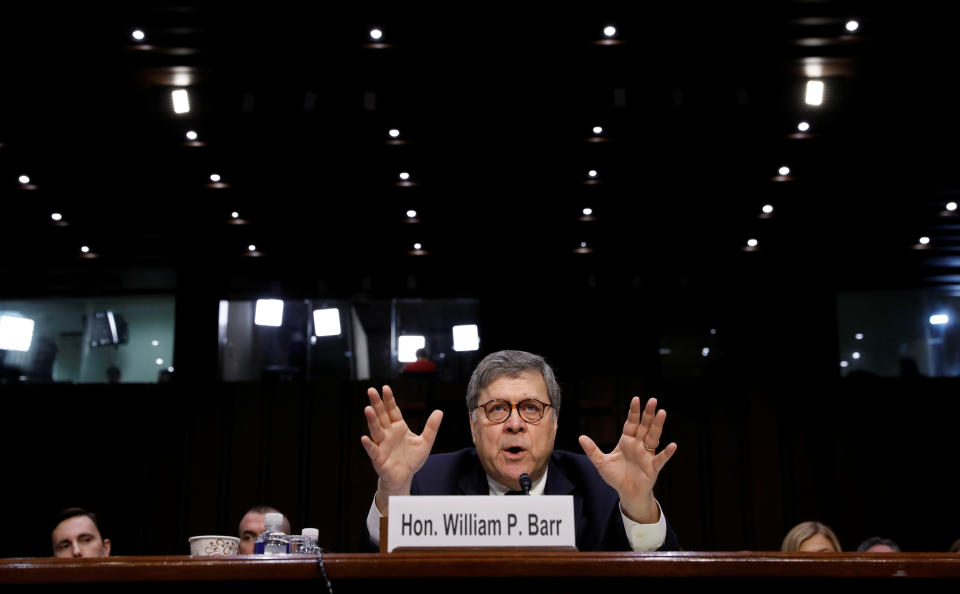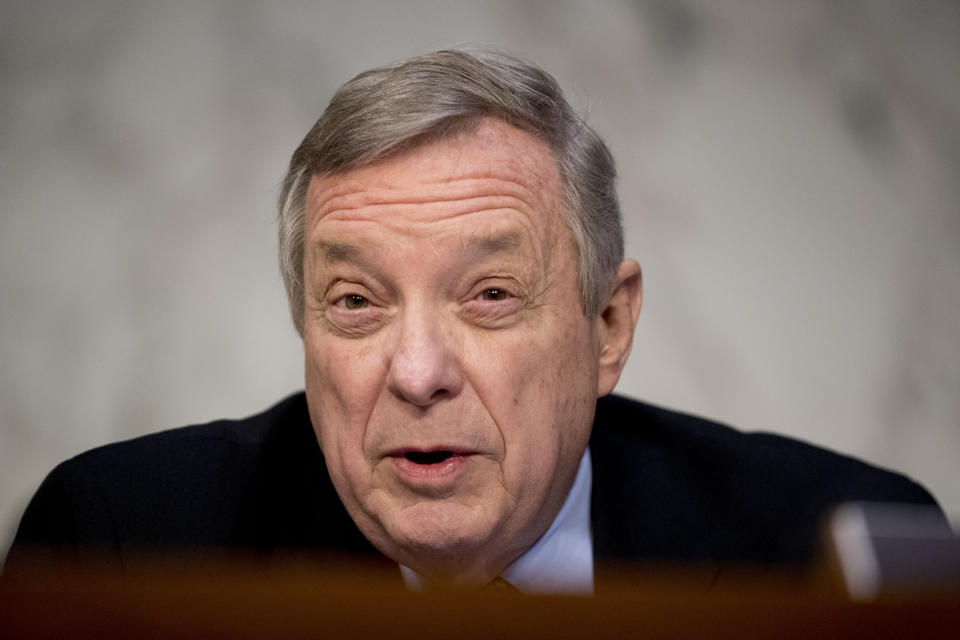Barr draws a line for Trump: ‘I will not be bullied’
- Oops!Something went wrong.Please try again later.
William Barr, President Trump’s nominee for attorney general, went to great lengths Tuesday to assure senators of his commitment to letting special counsel Robert Mueller complete his investigation.
“I will not be bullied into doing anything I think is wrong by anybody, whether it be editorial boards or Congress of the president. I am going to do what I think is right,” Barr said, in response to a question by Sen. Richard Durbin, D-Ill.
But Barr’s remarks also seemed directed at someone else: President Trump, who detests the special counsel’s probe and is widely believed to have chosen Barr because of his expansive views of presidential power and prerogatives.

The Senate Judiciary Committee’s questioning of Barr — in contrast to the way Supreme Court Justice Brett Kavanaugh was challenged at his confirmation hearing in October — was relatively cordial, and he is widely expected to be confirmed by the Republican-controlled Senate, with or without support from Democrats. But in going on the record, under oath, about his commitment to independence, Barr may have been sending a message to Trump. His testimony could be read as drawing a line in the sand for the president, who pressured his previous attorney general, Jeff Sessions, to reverse his recusal from overseeing the Mueller probe and eventually drove him to resign.
“If confirmed, I will not permit partisan politics, personal interests or any other improper consideration to interfere with this or any other investigation,” pledged Barr, who headed the Department of Justice under President George H.W. Bush.

Durbin and the ranking Democrat on the committee, Sen. Dianne Feinstein, D-Calif., pressed Barr on whether he would permit Mueller to finish his probe of possible collusion between the Trump campaign and Russia, and possible obstruction of justice in Trump’s firing of James Comey, the director of the FBI.
Trump has regularly denounced the investigation as a “witch hunt.” In response to a question from the judiciary committee’s chairman, Sen. Lindsey Graham, R-S.C., Barr said, “I don’t believe Mr. Mueller would be involved in a witch hunt.”
Barr added that he had worked closely with Mueller and considered him a good friend.
Feinstein asked Barr to commit to providing Mueller with the necessary funds and resources to finish his investigation, and not to fire Mueller “without good cause.” Barr agreed to abide by each of those requests. He also said he would allow the public and Congress to see the report Mueller is expected to conclude in the next few months “as much as I can” — reserving the right to redact or amend portions of it.
Democrats have raised the question of Barr’s independence in light of a memo he wrote and circulated last summer, as a private citizen, that by some readings suggested that a president is inherently immune to a charge of obstructing justice. In his opening remarks, Barr discussed that and said that this was not what his memo meant.
“The memo did not address — or in any way question,” he said, “the special counsel’s core investigation into Russian interference in the 2016 election. Nor did it address other potential obstruction-of-justice theories or argue, as some have erroneously suggested, that a president can never obstruct justice.”

Durbin asked a question that seemed more directed at Barr’s state of mind than his judicial philosophy: In light of how Trump treated Sessions, how he has “lashed out” against federal judges and the FBI and forced out many members of his administration: “Why do you want this job?”
“Because I love this department and all its components, including the FBI, and I think they’re critical to preserving the rule of law,” he answered.
“What would be your breaking point? When would you pick up and leave? When is your Jim Mattis moment, when the president has asked you to do something you think is inconsistent with your oath?” Durbin persisted, referring to the defense secretary who resigned last month over Trump’s precipitous decision to withdraw forces from Syria. “Doesn’t that give you some pause?”
“It might give me pause if I was 45 or 50 years old, but it doesn’t give me pause right now, because I had a very good life. I have a very good life, I love it,” Barr, who is 68, responded, adding, “and I am not going to do anything I think is wrong.”
_____
Read more from Yahoo News:



